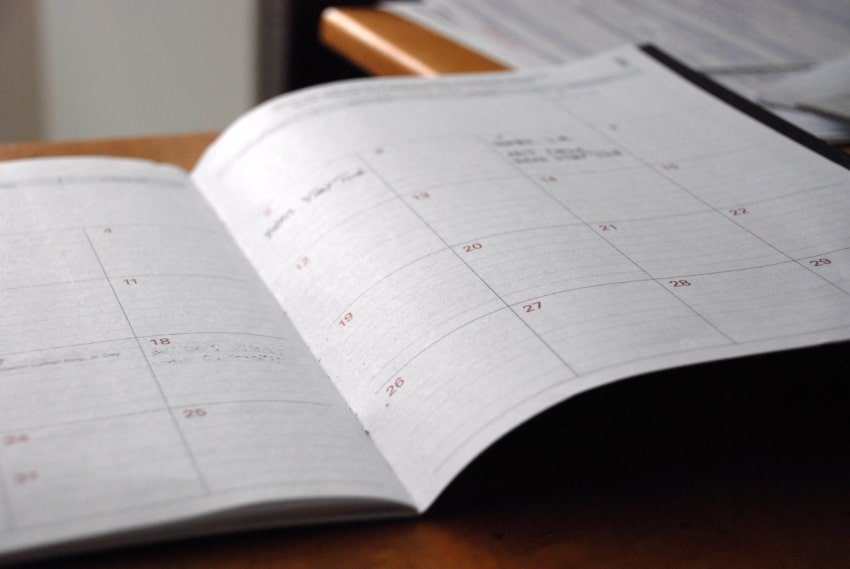12 Best Tips to Balance School and Work
Updated: June 19, 2024

Learning how to balance school and work is exactly that — a balancing act. Choosing to further your education at college requires both dedication and perseverance. This is especially true when you have to hold down a job. You’ll have to find ways to get schoolwork done and tend to your work responsibilities, all the while avoiding burnout.
For some students, you will also have to take care of your family. It’s very clear that with all the different aspects of life, finding alone time and time for friends is also necessary.
That’s why learning how to balance college and work is a strong skill to hone as early as possible in your academic career. There are a variety of ways to achieve doing so.
Let’s take a look at some strategies and ideas.
Source: Unsplash
Tips for Finding Balance
1. Learn Time Management
Perhaps the most important tool, which may seem obvious, is learning time management. Time management is defined as the “ability to use one’s time effectively or productively,” and for the most, it’s easier said than done. That’s because many people fall into the habit of procrastination, or putting off what has to be done for later.
Responsibilities like school and work are hard to prioritize when fun alternatives exist, but once you manage your time, you will be able to alleviate stress and be more successful.
Some useful tools for time management include:
- Update Your Schedule: You don’t have to have a type A personality to learn how to schedule your time. Start by leveraging a digital calendar or buying a planner to divide up your time in advance of your week. That way, you can schedule your time in to get the things you need to do and then also make time for fun activities like socializing, sports, hobbies, and more. Keep it up-to-date so that you don’t miss anything important and can plan ahead.
- Break Up Your Tasks: When you have a lot of tasks to get done, try to break up your to-do list into smaller and more approachable bits of activity. For example, if you have to read four chapters of a textbook for a test, read two chapters a day for two days, or one chapter a day for four days. Do whatever it takes to make tasks more approachable so that you limit procrastination and reduce feelings of being overwhelmed.
2. Do What You Enjoy
While it’s not always possible or financially feasible, you should try to find a job that you actually enjoy. Although this is not always in your control, train yourself to see the good in whatever job you do so that you can approach work with a positive mindset.
Love What You Study
In the same way, you should learn about things that you are interested in learning about. More often than not, you have the opportunity to major in and study what you actually like. If you’re not pressured by family to major in a particular field of study, choose what you are interested in so that learning piques your curiosity rather than squanders it.
3. Communicate
Although it seems intuitive, many people forget to take this step. If you are a student who has a job, be sure you tell your boss that you are in school. Most business owners and managers will be accommodating to this situation and help you to create a schedule that works best for your school time, too. Additionally, they may even be willing to provide you with time off during exams or big projects.
Depending on the type of school you attend, you can also create a flexible schedule around your job. This is especially doable if you attend an online school like the University of the People, where everything happens online. As such, you can study whenever and wherever you choose, which makes it easier to hold down a job while you learn.
4. Support Circle
One of the most important things to remember, especially when you inevitably feel overwhelmed, is that you are not alone. A lot of people are in the same situation as you, balancing work and school. By connecting with people who are in the same boat, you can learn tips and tricks from your peers.
Ask For Help
Additionally, by having a support circle, you can lean on people for help when you need it and offer help when you have the time and energy to do so.
5. Use Time Wisely
Going hand in hand with time management is learning tips and tricks to maximize the use of your time. This can happen in several ways, including finding jobs and schools that are near where you live (or online). That way, you can cut out the time it takes to commute which can add up to a lot of extra hours in a week.
Additionally, when you cook meals, cook extra on purpose so you can save some for the rest of the week. This tactic is known as meal prepping.
Furthermore, when you set time limits on social media, you will be able to allocate the time wasted to completing more important tasks, like studying. There are tools on most phones that can help you set application limits and refocus your time. You need to know your limits and trust your abilities when you are using your time wisely.
Importantly, listen to your body and mind and know when you need to take a break and hit reset to avoid burning out.
Leverage Your Natural Tendencies
Get to know yourself. If you tend to be a night owl and have most of your energy at night, then dedicate that time to learning material that is more challenging. If you’re a morning person, get up early and knock off tasks from your to-do list. Spend the time that you’re most productive working on the most challenging work, or subjects that require extra energy and effort.
6. To-Do List
A really simple strategy to master your time is to create and use a to-do list. Oftentimes, you can forget a task because you didn’t write it down. You can reduce feelings of the stress of having to remember everything when you write down what you have to do.
When you are writing down things you have to get done, you can also create a distraction to-do list. This is done by writing down things that are causing you to lose your focus when you are working on a task. When you take a break, you can revisit your distraction to-do list and go through each line item. This tactic helps to keep you focused.
Prioritize
There are optimal ways to structure a to-do list, and this includes organizing it in numerical order based on priority. Your priorities likely constantly shift, so be sure you keep your to-do list up-to-date. For school tasks, a simple method for prioritization is to base the list off of the nearest deadlines.
7. Procrastinate Productively
Procrastination is bound to happen, but you can procrastinate strategically. If you don’t want to perform a specific task at a specific time, try another one that you have to get done.
For example, if you are not feeling focused enough to get reading done, cross something else off your list by cleaning or organizing.
Our moods and the time of day is bound to affect our concentration levels, so it’s okay to not feel ready to do something you have to do. But, rather than wasting time, shift your focus to another necessary to-do on your list.
Work Ahead
On the opposite end of the spectrum is working ahead. If you have the extra time and energy to get something done, even if it’s very early in the timeline, this will free up time in your future. It can also help to alleviate stress during your busy weeks. Whenever possible, working ahead is like buying extra time for your future self.
8. Overlapping
Whether your job is directly related to your school or not at all, try to find the places in which work and school overlap. In these cases, you can apply one skill to another area of your life and reap the benefits.
For example, if you work in a marketing department, you can use the skills you learn for presentations and communication to study better and/or create more interesting school projects.
9. Take Breaks
Burnout is a side effect of chronic stress related to school or work. It is characterized by exhaustion, cynicism, and feelings of reduced ability to function. In order to avoid or reduce such feelings, you should know how to take effective breaks.
Make Time for Yourself
You can schedule breaks into your weekly planner or use techniques where you focus for 25 minutes straight and then break for 5-10 minutes — this is known as the Pomodoro Technique. When you take a break, do something you like or go for a walk. Try to let your brain rest and reset before jumping back into work.
When you don’t have to get anything done, spend time doing things that you enjoy and removing your mind for work and school. Whether that involves pampering yourself at a spa, going on a hike, reading, being with friends, etc.m you need to take time for yourself.
10. Sleep
If you are tired, it’s hard to be productive and have good energy for anything. When you sleep, you give your body and brain the time it needs to recuperate. That’s why sleep is so important. It also helps to regulate your hormones and body functioning. Of course, there will be times when you are not getting 6-8 hours of sleep per night, but it should be your goal. If you properly manage your time and make the most out of your hours of productivity, you should be able to get to sleep at a decent hour and then wake up early to get to work the next day!
11. Your Work and Study Space
Your environment is of utmost importance when you study. You want to be sure that you set yourself up in a comfortable setting with everything you need to be productive. From ensuring you have food and water, to adequate lighting and distraction-less work space, these considerations will play a big role in your ability to stay focused.
12. Remember Your Goals
When the going gets tough, it’s especially important to remember why you started and remember your goals. It may help to write these down somewhere you can see them, like a whiteboard or on a post-it on your mirror for extra motivation.
Celebrate Small Wins
Consider setting up a positive feedback loop through the form of rewards for yourself. When you complete an assignment or get positive feedback from work, take the time to celebrate these wins by doing something you love.
High School and Part-Time Work
If you’re still in high school and you have a part-time job, the aforementioned tips can help you, too.
However, as a high school student, you may need to rely more on support from your family. Talk about your schedule with your family and ask for their advice. Also, consider starting with less hours per week until you get into a flow and can be sure that you can balance both work and school. If you feel you are able to take on more work, talk to your boss about adding more hours to your schedule.
The good thing about working part-time during high school is not only that you will be on your way to financial independence, but you will also be honing skills like time management and responsibility that will help you when you start college.
Online Opportunities
Working and going to school takes dedication, perseverance, time management, and importantly, a positive attitude. Although it’s a challenge to balance both, there are online universities that can make this balancing act easier to manage.
The University of the People offers a place where students can earn their degree in four subjects on their own time. Students can choose to major in Computer Science, Business Administration, Health Science or Education. With online education, you have the power to choose when and where you study.
In fact, 98% of our enrolled students also work while attending school. Therefore, you will be able to lean on the support of peers who understand your situation and can help share effective strategies for balancing school and work.
Source: Unsplash
The Choice is Yours
However, you decide to balance school and work is up to you. From setting a schedule in advance to asking for help, you are capable of managing all your responsibilities! By practicing a positive mindset and using your time wisely, you will set yourself up for success in all aspects of your life.



